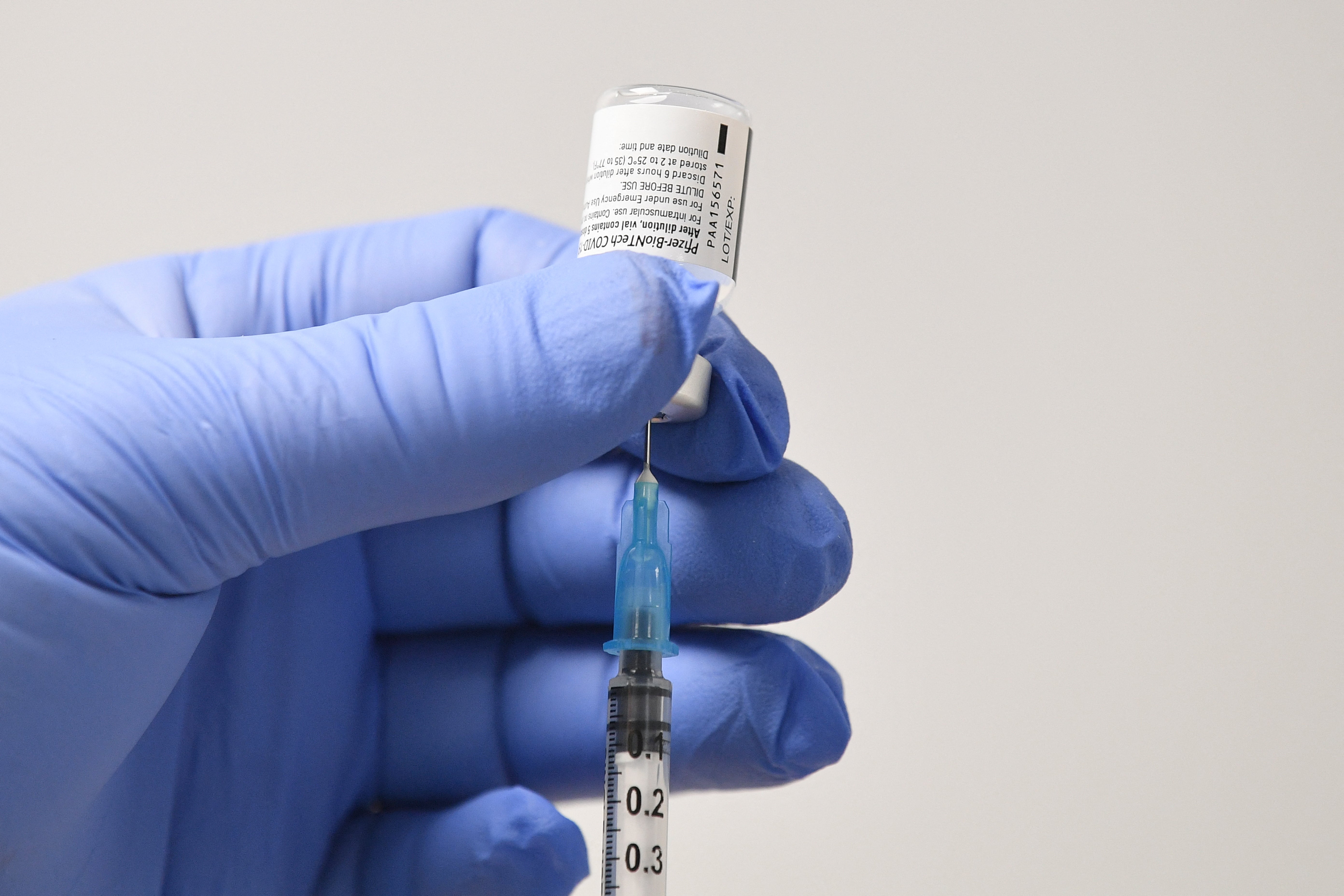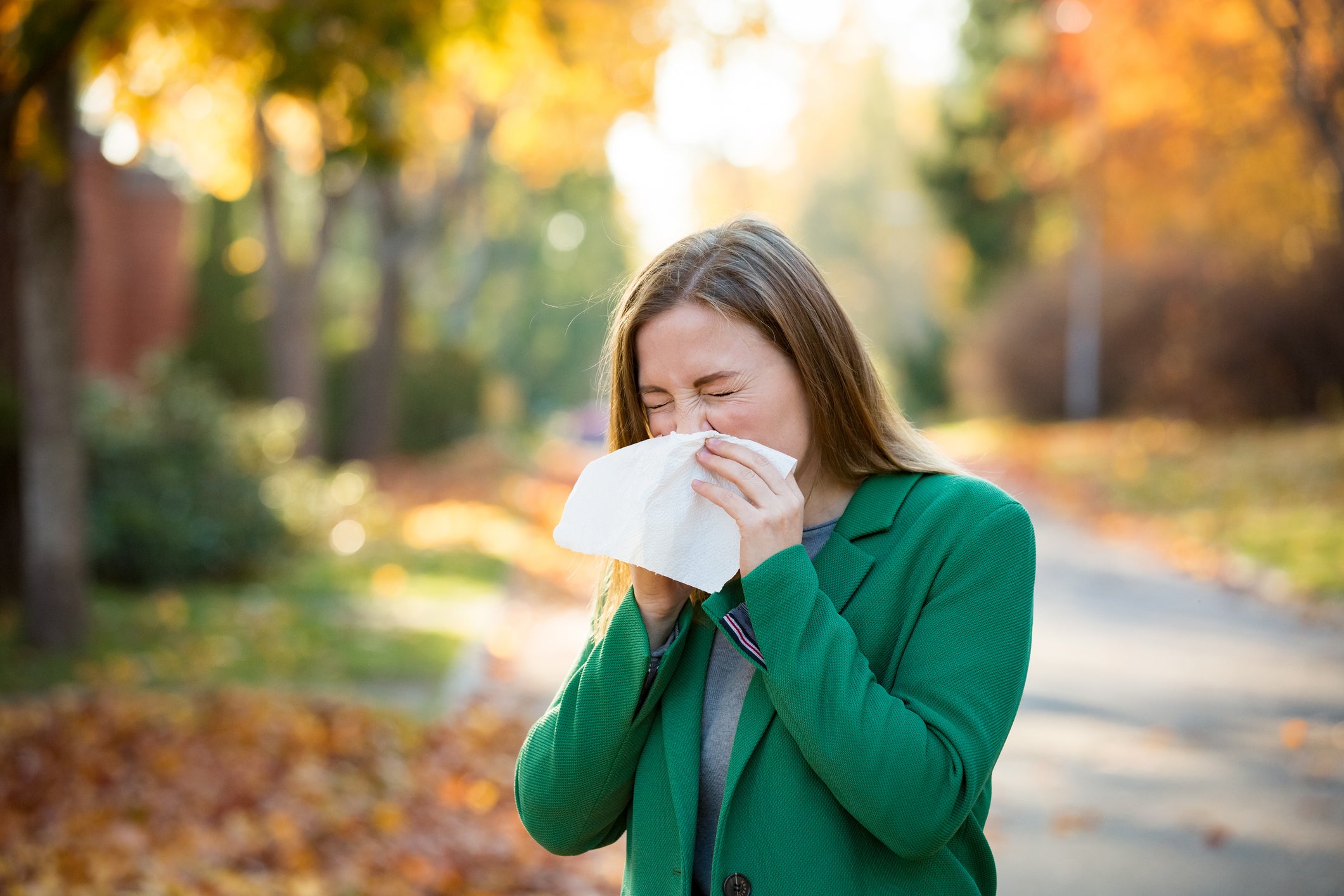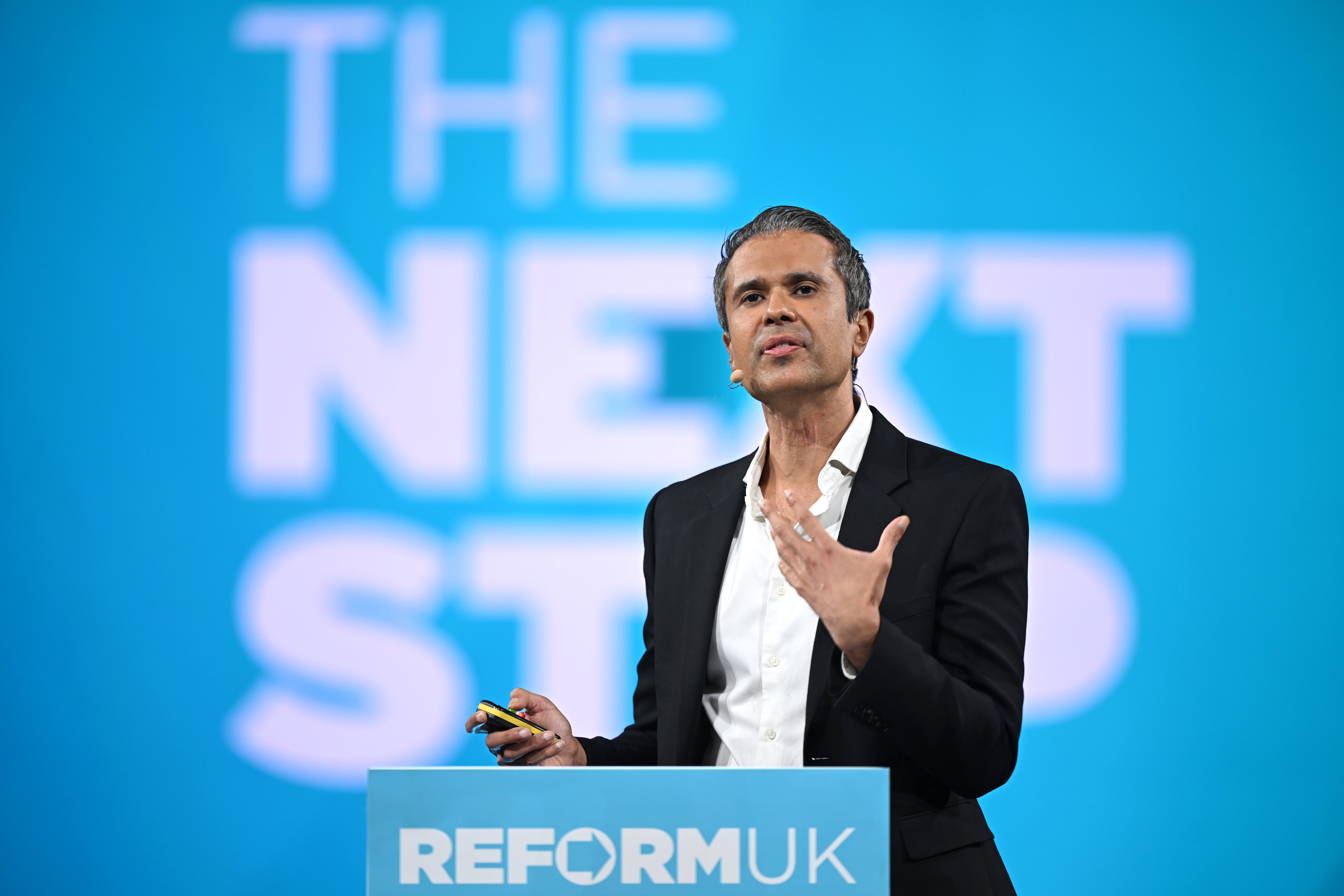

HEALTH
Fitness Trainer Shocked by Terminal Brain Cancer Diagnosis While Feeling Completely Healthy
Published
1 month agoon
By
OBS
A man living with terminal brain cancer has declared it his “purpose in life” to break the world record for the most money ever raised by a marathon runner, a figure currently exceeding £2 million.
Iain Ward, 36, a content creator residing in Streatham, south London, received a diagnosis of glioblastoma – an aggressive form of cancerous brain tumour – in 2020.
His condition was discovered following an MRI scan in 2019, undertaken as part of a medical trial.
Despite having always been fit, healthy, and experiencing “zero symptoms,” Mr Ward described the detection as “a freakish amount of luck,” believing the tumour might have otherwise gone unnoticed.
Since his diagnosis, Mr Ward, an active runner, has completed 18 marathons. His ambitious goal is to surpass the existing Guinness World Record for individual marathon fundraising, which stands at £2,330,159.38 and was established in 2011.
He has extensively documented his journey and remarkable challenges on social media under the handle @thekingofchemo, amassing a following of more than 14 million.
Among his most notable feats, in August 2025, he even completed 32 half-marathons on 32 consecutive days across all 32 counties of Ireland, all while wearing a 32lb weighted vest.

To date, he said he has raised more than £350,000 for numerous charities and has now set his sights on breaking the record for the most money raised by a marathon runner at the New York City Marathon this November, with the aim of “trying to help others”.
Iain told PA Real Life: “It’s been extremely satisfying because I never really had a purpose in my life… and I do now.
“There’s more of a feeling of why I’m doing something and how it actually has a positive effect on the world.
“I just see it as problem-solving where a lot of people are suffering through cancer, and I want to raise money to help that and set a decent example of how important fitness is in general.”
Before his diagnosis, Iain worked as a fitness class instructor and was a keen runner, completing three marathons before starting to run them as his “profession”.
In 2014, after moving to London from High Wycombe, Buckinghamshire, he began taking part in paid medical trials to earn some extra money.
Ahead of a schizophrenia trial in autumn 2019, an MRI scan revealed a tumour on his brain.
“It was a freakish amount of luck,” he explained.
“If it was an MRI scan on any other part of my body, it wouldn’t have been detected.
“I had zero symptoms or warning signs.
“Doctors said it was benign to begin with… and then I wasn’t able to do the medical trial which I was very disappointed about.”

Around six months later, scans showed the tumour was growing and, after undergoing brain surgery, Iain was diagnosed with glioblastoma in 2020.
Iain said his doctor told him the average life expectancy is around five years, but they have limited data on what the prognosis is like for someone of his age with no symptoms.
“I could be dead in a year or I could be on the far end of the average life expectancy. It could be up to 10, maybe even 15 years,” he added.
“I didn’t really have time to grieve or get very fearful… it was just such a shock that I couldn’t take it in.”
During the Covid-19 pandemic, Iain launched a YouTube channel to make video game content.
Facing the possibility of hair loss from his cancer treatment, which included chemotherapy and radiotherapy, Iain chose to speak openly about his condition on his channel.

He said: “I thought I might as well raise some money for charity while talking about it.
“I looked up the record for the most money raised running a marathon and decided, ‘Yep, I’ll beat that’.”
According to Guinness World Records, the most money raised for charity by an individual marathon runner is £2,330,159.38, which was set by Steve Chalke, from the UK, who raised the money for Oasis UK by completing the Virgin London Marathon on April 17 2011.
Iain added: “I’ve actually met up with Steve – it’s a title people like to pass over to the next person.
“He gave me loads of advice on how to go about it but he said that if I win it, he’s going to win it back off me!”
In summer 2021, Iain said he ran 52 miles in a “double marathon” on a treadmill in 12 hours.
“It was surprisingly fine,” Iain explained.
“The hardest part would have been how boring it was, because it was on a treadmill, so it was just all day.
“I was having chemotherapy treatment at the time… and around the time of the challenge I was getting sick every 15 minutes, but I was OK on the day.”

He said he managed to raise more than £1,000 and has been determined to do as much fundraising as possible since then.
In 2024, he ran the Boston, London, Austin, Berlin, Chicago and New York City marathons, raising around £100,000.
Iain has been sharing his experiences on social media, where he has built a following of more than 14 million people while raising awareness about the realities of living with a terminal illness.
He also appears in The Endfluencers – a new social documentary by end-of-life charity Marie Curie and health and beauty retailer Superdrug – which highlights individuals nearing the end of their lives who use social media to document their journeys.
He said: “I want to be treated like a normal person… but it’s cool to be able to be a part of a documentary that is going to show the different shades of how people deal with a terminal illness.”
In August 2025, he attempted another challenge – completing a half-marathon in each of Ireland’s 32 counties over 32 consecutive days, wearing a 32lb weighted vest – and from this, he said he raised £7,000 and counting.
“I thought I might have some physical problems during the journey and I didn’t, it was absolutely brilliant,” Iain said.

Since his diagnosis, Iain said he has run 18 marathons and now has four MRI scans a year to “keep an eye on his tumour to see if it has grown”.
He added: “I could potentially go back onto chemo and do more radiation and more brain surgery if it has grown.”
He also said doctors are still uncertain on his exact life expectancy.
Iain has now set his sights on breaking the world record for most money raised by a marathon runner on November 2 2025, while completing the New York City Marathon.
“Even though over several years the world record might not be broken, every single year we’re more likely to break it the following year,” Iain explained.
“I show no signs of stopping or giving up.
“Since I started raising money (in 2020), I’ve raised £350,000.”
While running the marathon, he also hopes to break the Guinness World Record for the most T-shirts worn during a marathon by a male.
The current record is 100, and Iain plans to wear 101 to “put the fun into fundraising”.
Reflecting on his experiences, he said: “It (having cancer) hasn’t really taught me anything new about myself.
“For me, an opportunity was presented, and I guess I’m just trying to push myself to my limits, do something of meaning for myself and, as a side bar, help other people.”
You may like
-


Shocking Stories: What It’s Really Like to Get a Life-Changing Diagnosis via Text
-


Are You at Risk for Prostate Cancer? Discover Why Some Men Could Miss Important Screenings!
-


Revolutionary ‘Super Vaccine’ May Completely Halt Cancer Spread!
-


Discover the Pharmacy Cream That Can Help Fight Skin Cancer!
-


Game-Changer: New Treatment for Late-Stage Prostate Cancer Offers Hope for Men
-


Unlocking Hope: New Method Discovered by Scientists to Treat Advanced Prostate Cancer
HEALTH
Can’t Tell If It’s Covid or the Flu? Here Are the Key Symptoms You Must Recognize as Cases Surge!
Published
2 weeks agoon
October 16, 2025By
OBS
Health officials are warning of a seasonal surge in flu and Covid-19, with cases already starting to rise as autumn arrives.
But because the two viruses share many symptoms, it’s difficult to tell them apart.
When a sniffle seems to progress further than “just a cold”, it’s hard to know what it might be – but there are differences in how the viruses appear and the risks they pose.
Do I have Covid?
Covid-19 continues to cause serious illness, particularly among vulnerable groups. The virus is constantly evolving, with new variants spreading easily through coughs, sneezes or even conversation.
Vaccination campaigns each autumn continue to try to prevent hospitalisations and deaths.
The list of symptoms has shifted since 2020. Many people now experience cold-like symptoms, such as a runny nose, sore throat or blocked sinuses. But others still report fever or chills, a persistent cough, fatigue, headaches, shortness of breath, or a loss of taste and smell. Nausea and diarrhoea can also occur.
Doctors say a hoarse throat has become one of the hallmark features of the latest variants.

The latest strain, called Stratus, has two variants, XFG and XFG.3. Another recent strain, NB.1.8.1 nicknamed Nimbus, is also prevalent.
“Stratus is linked to hoarseness and fatigue, whereas Nimbus is associated with a ‘razor-blade’ sore throat and digestive symptoms like nausea and bloating,” explains Dr Bruno Silvester Lopes, lecturer in microbiology at Teesside University. “Both are highly transmissible but not more severe than previous variants.”
Despite accounting for a large proportion of new cases, experts are not concerned about the spread, noting it is normal for viruses to mutate and change.
Those aged 65 and over, care home residents, and people with underlying health problems are all entitled to the Covid-19 booster.
Do I have the flu?
Flu is a respiratory infection that strikes hardest in winter and can be far more debilitating than the common cold. While colds typically bring a runny nose, sneezing, watery eyes and mild throat irritation, flu tends to arrive suddenly with fever, aches and exhaustion.
Last winter alone, the flu sent more than 8,000 people to hospital. Over the past two years, at least 18,000 deaths in the UK have been linked to the virus. Children, older adults, people with long-term health problems and those with weakened immune systems face the highest risks.

Vaccination remains the strongest defence. Research shows that last year’s jab prevented thousands of severe cases, cutting hospital admissions by almost a third among over-65s and by more than half among children aged two to 17.
This autumn, the flu vaccine is being offered free to those over 75, pregnant women, children aged 2 and 3 through their GP, and schoolchildren from reception to year 11 via nasal spray. Adults under 65 with certain health conditions are also eligible.
How to tell difference between Covid and a cold
Colds and Covid can be tricky to distinguish as many of their symptoms overlap.
“Both can give you a sore throat, runny or stuffy nose, sneezing, and coughing,” says Dr Chun Tang, a GP at Pall Mall Medical. “However, Covid can also cause fever, fatigue, muscle aches, and that telltale loss of taste or smell – although that’s less common with newer variants.
“Covid is also more likely to make you feel wiped out, like you’ve been hit by a truck, whereas a cold tends to stay in your head and chest.”
“Both spread mainly through droplets when someone coughs, sneezes, or even talks near you,” says Tang. “Covid, however, can also spread more easily through the air in tiny particles that linger, especially in crowded or poorly ventilated spaces.
“So, while a cold might need a bit of close contact to catch, Covid can sometimes sneak across the room if you’re unlucky.”
Are cases climbing now?
According to the UK Health Security Agency, levels of flu and Covid-19 are already on the rise running into winter, joining other seasonal bugs such as RSV and norovirus.
UKHSA reported an increase in the number of reported Covid diagnoses in its 9 October report, with the most prevalent strain noted as Stratus XFG. Flu activity was also increasing among young adults with a surge in emergency department attendances for flu-like illnesses.
Experts say the risk is highest during the colder months when viruses spread more easily indoors.
Officials are urging everyone eligible to take up their vaccines to reduce the strain on hospitals and protect the most vulnerable. Both flu and Covid-19 can be serious, but prevention and early awareness remain the best tools against them.
HEALTH
Shocking Recall: Grocery Store Taco Kits Contain Hot Chocolate Packets!
Published
2 weeks agoon
October 16, 2025By
OBS
The Giant Company is recalling its Giant and Martin’s-branded hard taco dinner kits after hot chocolate sachets were discovered inside the packages.
The mix-up, announced October 10, could pose a risk to consumers with milk allergies.
The recall affects the 9.4-ounce Giant/Martin’s Hard Taco Dinner Kit (UPC 068826757516) all lot and codes, with a best-by date of March 13, 2026.
Consumers with a milk allergy should not eat the kits. Anyone who purchased the affected product can return it to a nearby store with a receipt to receive a refund.
Milk allergy is a common food allergy in children, caused by cow’s milk or milk from other mammals, according to Mayo Clinic.
.jpg)
Reactions can occur soon after consumption and range from mild symptoms like hives, vomiting, and digestive issues to severe, life-threatening anaphylaxis.
The main treatment is avoiding milk and milk products. Most children outgrow the allergy, while others may need to avoid milk long-term.
Meanwhile, Sno Pac Foods, a Minnesota-based company, has issued a nationwide recall of its frozen spinach products due to potential contamination with Listeria monocytogenes, a bacterium that can cause serious infections.
The recall affects two products: Del Mar 35-pound Bulk Organic Frozen Spinach and Sno Pac 10-ounce Organic Frozen Cut Spinach. These products were distributed across various retail stores in the U.S. The recall was prompted after a bulk case of spinach from a supplier tested positive for the bacterium.
This same lot was used to repack the Sno Pac Organic Frozen Cut Spinach into 10-ounce bags. As a precaution, Sno Pac Foods has suspended production of these products while investigating the source of the contamination.
No illnesses have been reported in connection with the recalled products. However, Listeria monocytogenes poses a significant health risk, particularly to young children, the elderly, pregnant women, and individuals with weakened immune systems.
In healthy individuals, infection may cause short-term symptoms such as high fever, severe headache, stiffness, nausea, abdominal pain, and diarrhea. Pregnant women are especially vulnerable, as infection can lead to miscarriage or stillbirth.
HEALTH
Could Trump’s Meds Be Slowing Him Down? Expert Warns They Might Not Be Helping!
Published
2 weeks agoon
October 16, 2025By
OBS
An adviser to Health Secretary Robert F. Kennedy Jr. warned Wednesday that President Donald Trump may appear to be “slowing down” because of the medication he takes, as questions continue over the president’s mental and physical health.
In a speech to the European Parliament, Dr. Aseem Malhotra, a British cardiologist who advised the lobby group Make America Healthy Again, said that Trump, 79, may be suffering from fatigue due to his use of cholesterol medications, or statins, and aspirin.
“President Trump is taking statins; he’s on two cholesterol drugs… This man does not have any cardiovascular disease,” Malhotra said during a launch event for a new European health activism organization, Make Europe Healthy Again (MEHA).
“If you’re over 75 and have no cardiovascular disease, the benefit of statin is – are you ready? One in 446. You have to give the statin to 446 people to prevent one cardiovascular event,” he said. “In other words, no significant benefit.”
Malhotra, a vaccine skeptic whose anti-COVID shot and anti-statin views have been rebuked as misinformation by medical experts, has been a close ally to Kennedy.

His comments come amid claims that the president may be showing signs of “cognitive decline,” due to mixing up names and other gaffes. Despite the speculation, the White House said last week that Trump was in “excellent overall health” following a “routine check-up” at Walter Reed Medical Center.
In addition to concerns about his mental acuity, Trump’s physical health has also come under question. The president has often been photographed with bruising on his right hand, raising concerns that he is suffering from some illness. The White House insists that this is a result of him shaking hands with a large number of people and his use of aspirin, which he takes as a cardiovascular protection.
White House officials revealed earlier this year that he had been diagnosed with chronic venous insufficiency, a non-life-threatening condition caused by the veins struggling to return blood to the heart. The condition is common for people over the age of 70.
During his remarks, Malhotra noted that cholesterol medication often comes with side effects, saying: “The most common ones are fatigue, muscle pain. It can cause brain fog.”
He added: “Now, I know that President Trump is a remarkable man for his age, but there have been reports – probably exaggerated by some sort of devious press for sure. But I know people who are close to him… and of course he is doing a tremendous job and maybe only sleeping four hours a night, and that may be part of it too, but it could also be that he’s slowing down a little bit because of his statins,” he continued.

Malhotra then suggested that Trump go “off his statins, off his aspirin” and would be “feeling great” within a matter of weeks.
He was apparently so concerned about Trump taking the medications that he has reached out to several people close to the president to try and warn him against it, The Daily Beast reported Tuesday ahead of Malhotra’s public remarks.
In a statement to The Independent, the White House said: “President Trump is a champion-level golfer with the mental acuity and energy levels that most young people could not fathom having.”
“So-called medical ‘experts’, especially foreign ones with no relevance or involvement with the Administration, should stop beclowning themselves and marring their credibility by pitching their idiotic hot takes with Fake News outlets that have nothing better to cover,” White House spokesman Kush Desai said.

Along with Trump’s most recent gleaming health report, White House officials noted the president received a flu shot and an updated COVID-19 booster, which Malhotra called unnecessary.
“I think President Trump, I think he genuinely took the [COVID-19] booster, I don’t think that this is a front. I think he believes in what’s happening. He himself is also a victim of medical misinformation,” Malhotra said.
However, recent research shows that COVID shots protect against serious illness and death, especially for people over the age of 65. Researchers from the VA St. Louis Healthcare System looked at data from nearly 300,000 veterans and found that last season’s Covid vaccine reduced the risk of emergency room visits by 29 percent, hospitalizations by 39 percent and deaths by 64 percent for all ages, NBC News reports.
Combining all three outcomes, the shots’ overall effectiveness was 28 percent, making it similar to the flu shot, which ranges from 30 to 60 percent protective against severe illness or death.
An April health report also noted that Trump, who was the oldest person to ever take office in January at 78, was in “excellent” health.
The report also noted that Trump had high cholesterol that was being treated with the statin rosuvastatin and ezetimibe, a medication used to absorb cholesterol. He was also taking a low-dose aspirin as part of the treatment, his doctors said at the time.
While there is no evidence that statins alone cause dementia, the FDA added a safety warning to the medications in 2012 to warn of “notable, but ill-defined memory loss or impairment that was reversible upon discontinuation of statin therapy.”
Last month, Malhotra made headlines after suggesting – without evidence – that King Charles III may have gotten cancer because of the COVID-19 vaccine.
Categories
Top Tags
Related posts






















